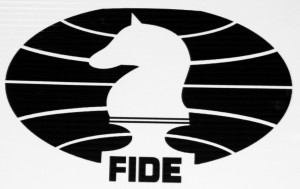Welcome to Purple Pawn, covering games played around the world by billions of people every day.
 FIDE (the World Chess Federation) is undertaking greater efforts to combat cheating at Chess tournaments. Aimed primarily at the possibility of players obtaining the aid of computers, FIDE plans to establish a permanent Anti-Cheating Commission and to adopt security measures for screening players and segregating them from spectators. Security measures may include searches and metal detectors, depending on the significance of the tournament.
FIDE (the World Chess Federation) is undertaking greater efforts to combat cheating at Chess tournaments. Aimed primarily at the possibility of players obtaining the aid of computers, FIDE plans to establish a permanent Anti-Cheating Commission and to adopt security measures for screening players and segregating them from spectators. Security measures may include searches and metal detectors, depending on the significance of the tournament.
Additionally, FIDE is in the process of developing a computerized tool that identifies cheating through statistical analysis of completed games. The tool is based on the work of Professor Kenneth W. Regan of the University at Buffalo Computer Science department, and rather than evaluating a player’s likelihood of winning, looks at the quality and consistency of individual moves. Dr. Regan’s research, for example, shows that human Chess players are more likely to make mistakes the further ahead or behind they are, whereas computer players perform consistently despite the present game state.
No Comments
Sorry, the comment form is closed at this time.
Trending
- Massdrop.com
- Oh the Irony—Illuminati Card Game Continues to Inspire Conspiracy Theorists
- Footprints, an Educational Ecology Game
- Home
- USPS Adds Board Game Flat Rate Box
- Baila, the Estonian Drinking Card Game
- Crystal Caste Wins Dice Patent Suit Against Hasbro
- Mirror Game, Red and Blue
- Are Board Games Dangerous?
- Board Games Based on Hindu Mythology
Archives
Most Popular Articles
- Oh the Irony—Illuminati Card Game Continues to Inspire Conspiracy Theorists
- The 20 Most Valuable Vintage Board Games
- The Truth About Dominoes On Sunday in Alabama
- Sequence Game, and Variants
- USPS Adds Board Game Flat Rate Box
- Baila, the Estonian Drinking Card Game
- The 13 Most Popular Dice Games
- Are Board Games Dangerous?
- Guess Who? The Naked Version
- What Happened to the Jewel Royale Chess Set?
Recent Posts
- Toy Fair 2019—Breaking Games
- Talisman Kingdom Hearts Edition
- Toy Fair 2019—Winning Moves
- Toy Fair 2019—Games Workshop
- Toy Fair 2019—Star Wars Lightsaber Academy
- Toy Fair 2019—Stranger Things Games
- Toy Fair 2019—HABA
- Licensing Roundup
- Game Bandit
- 2018 A Difficult Year For Hasbro But Not For D&D Or MtG
Recent Comments
- on Toy Fair 2019—Winning Moves
- on Game Bandit
- on Second Look—Dungeons & Dragons Waterdeep Dragon Heist
- on Crowdfunding Highlights
- on Beyblade SlingShock
- on Game Bandit
- on Game Bandit
- on Watch This Game!, the Board Game Review Board Game
- on Second Look—Vampire: The Masquerade 5th Edition
- on Palladium Books Loses Robotech IP License, Cancels Five-Year-Overdue Robotech RPG Tactics Kickstarter




